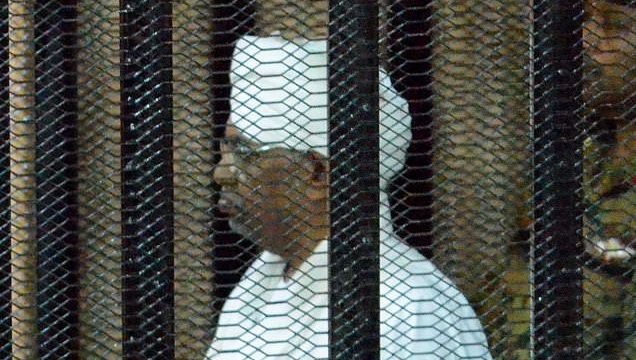Saudi Arabia’s crown prince Mohammed bin Salman ‘gave Sudan’s deposed military ruler $90million in CASH’, corruption trial hears
- Omar al-Bashir allegedly received the money ‘to be used outside state budget’
- It allegedly came from crown prince Mohammed bin Salman and a former King
- Bashir was toppled from power earlier this year after ruling Sudan for 30 years
Former Sudanese ruler Omar al-Bashir received $90million in cash from Saudi Arabia’s royal family including crown prince Mohammed bin Salman, a court heard today.
The former president, who was ousted in April after 30 years in power, allegedly received the money from Prince Mohammed and former Saudi King Abdullah ‘to be used outside of the state budget’.
Investigators at the Khartoum trial, where Bashir sat in a metal cage on the opening day today, said huge amounts of cash had been found at his residence.
Bashir faces a raft of charges of war crimes, crimes against humanity and genocide from the International Criminal Court over his role in the Darfur war, but the trial which began today is over graft allegations.
Former Sudanese ruler Omar al-Bashir, pictured in a metal cage during his trial in Khartoum today, allegedly received millions of dollars in cash from the Saudi royal family
January 1, 1944: Bashir is born to a farming family in the village of Hosh Bannaga, (60 miles north of the capital Khartoum.
1973: A soldier from a young age, Bashir fights alongside the Egyptian army in the Arab-Israeli war.
June 30, 1989: As brigade commander and with the backing of Islamists, Bashir seizes power in a coup against the democratically elected government.
2003: Bashir sends troops and militiamen to crush a rebellion in the western region of Darfur. The conflict claims more than 300,000 lives, according to the UN.
2009: The International Criminal Court issues a warrant for Bashir’s arrest for war crimes and crimes against humanity in Darfur. The following year it issues a warrant for committing genocide. He denies the charges.
2010: Bashir is elected president in the first multiparty election since he took power, which is boycotted by the opposition. He is re-elected in 2015.
2013: Demonstrations against Bashir’s government erupt after a hike in petrol prices. Officials say dozens are killed in related violence.
April 11, 2019: Bashir is removed from office by the military and detained after months of nationwide rallies demanding he step down, which began in December 2018.
May 13, 2019: Bashir is charged over killings of protesters during the anti-regime demonstrations.
August 19, 2019: Bashir’s trial on corruption charges opens in Khartoum.
The 75-year-old arrived in a huge military convoy before his relatives shouted ‘Allahu Akbar’ as proceedings began.
‘The accused [Bashir] told us that the money was part of a sum of $25million sent to him by Prince Mohammed bin Salman to be used outside of the state budget,’ investigator Ahmed Ali said.
Bashir had allegedly received two earlier payments of $35million and $30million from Saudi King Abdullah, who died in 2015.
‘This money was not part of the state budget and I was the one who authorised its spending,’ the investigator quoted Bashir as saying.
Prince Mohammed is widely seen as Saudi Arabia’s de facto ruler.
Bashir said the Saudi money was spent but that he could not remember how, nor did he have documents providing further details, the court heard.
The former president’s lawyer dismissed the accusations, telling reporters after the hearing it was usual for leaders to hold amounts of foreign currency.
Bashir, who had ruled since 1989 until he was toppled in April, looked calm during the nearly three-hour session. The next hearing was scheduled for August 24.
In May, Sudan’s prosecutor general said Bashir had also been charged over killings during the anti-regime protests which eventually led to his downfall.
London-based rights watchdog Amnesty International has warned however that the corruption trial should not distract from his Darfur indictments.
‘While this trial is a positive step towards accountability for some of his alleged crimes, he remains wanted for heinous crimes committed against the Sudanese people,’ Amnesty said.
Amnesty urged the country’s new transitional institutions to ratify the ICC’s Rome Statute, a move that would allow for his transfer to the international tribunal.
Bashir, pictured in the courtroom today, also faces a raft of charges of war crimes, crimes against humanity and genocide over his role in the Darfur war
The Hague-based ICC has for years demanded that Bashir stand trial, and has renewed its call since his fall.
The head of Bashir’s defence team, Ahmed Ibrahim al-Tahir, said in July that the ousted leader’s trial had no ‘political background’.
‘It is an absolute criminal case with a baseless accusation.’
A sudden tripling of bread prices in December sparked mushrooming protests which led to Bashir’s toppling by the army in April.
A joint civilian and military sovereign council that will steer the country through a 39-month transition was due to be unveiled on Monday.
The ruling sovereign council will be composed of 11 members including six civilians and five from the military.
It will be headed by a general for the first 21 months and by a civilian for the remaining 18 months.
The council will oversee the formation of a transitional civilian administration including a cabinet and a legislative body.
It remains unclear how the transitional institutions will tackle the daunting task of pacifying a country plagued by several conflicts, including in the regions of Darfur, Kordofan and Blue Nile.
Source: Read Full Article


